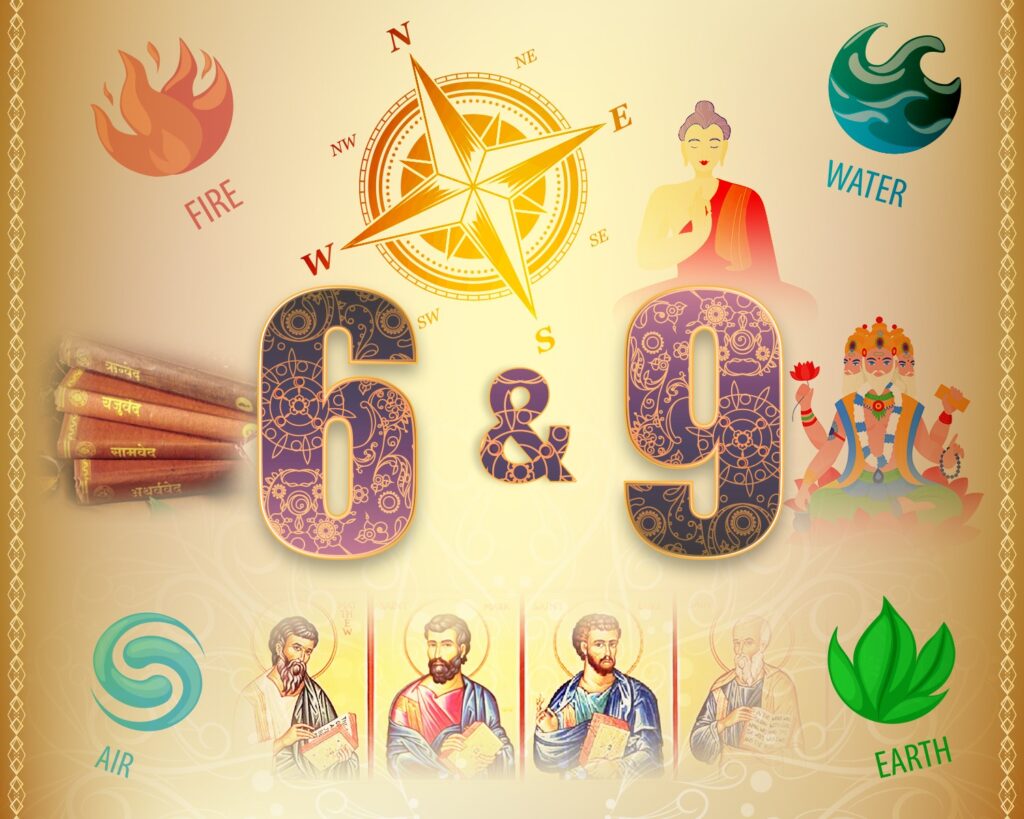Previously, we shared with you our findings on some of the many examples of the number “3” that appear prominently across various religious and cultural traditions. But multiples of 3, 6 and 9 in particular, are actually just as prominent. The great inventor Nikola Tesla was obsessed with these numbers, believing them to be fundamental components of the very fabric of reality. He would accordingly incorporate 3s, 6s, and 9s into as many parts of his daily routine as possible: for instance, only staying in hotel rooms that were divisible by 3. While we need not go to such extremes in our own lives, a little reflection on the significance of these numbers can be a source of wonder and inspiration.
“If you only knew the magnificence of 3, 6, and 9, then you would have the key to the universe.”
— Nikola Tesla, inventor and engineer
“God saw all that he had made, and it was very good. And there was evening, and there was morning—the sixth day.”
—The Hebrew Bible (Genesis 1:31), Jewish text
“Baháʼís revere [the number 9] for two reasons, first because it is considered by those interested in numbers as the sign of perfection. The second consideration, which is the more important one, is that it is the numerical value of the word “Baháʼ.”—Shoghi Effendi, Baha’i leader

Judaism: In the Abrahamic traditions, the number 6 is associated with the six days of creation, as recounted in the Book of Genesis in the Hebrew Bible. According to the biblical account, God created the world in six days and rested on the seventh day, which became the Sabbath. The Star of David symbol is also a 6-pointed star.
Islam: There are 6 articles of faith that outline the major beliefs of Muslims. Additionally, the number 9 is significant because Ramadan, the holy month of fasting and prayer, is the 9th month of the Islamic calendar.
Hinduism:In Hindu astrology and mythology, there are nine celestial bodies known as the Navagrahas. These include the Sun, Moon, Mars, Mercury, Jupiter, Venus, Saturn, Rahu, and Ketu. While the number 9 itself is significant due to the nine planets, the numbers 6 and 9 may be associated with specific planets’ attributes, such as the Sun and the Moon. In some meditation practices and Kundalini yoga, there are six primary chakras that are often discussed. These chakras are energy centers within the body, and their alignment and balance are considered important for spiritual growth. Similarly, the number 9 may also be significant in discussions related to the chakras, as it can represent the culmination of the lower six chakras with the addition of the three higher chakras. The number 108 is considered to be very significant.It equals 6*9*2
Christianity: In Christianity, the number 9 is associated with the 9 fruits of the Holy Spirit: love, joy, peace, patience, kindness, goodness, faithfulness, gentleness, and self-control.
Buddhism: In Buddhism, the number 6 relates to the Six Perfections (paramitas) that are essential for attaining enlightenment: generosity, ethical conduct, patience, effort, concentration, and wisdom. The number 9, meanwhile, is associated with Gautama Buddha’s 9 virtues. Buddhist rituals also often feature 9 monks.
Baha’i: The word “Baháʼ” has an equivalence of 9 in Baha’i numerology, and thus there is frequent use of the number 9 in Baháʼí symbols. The most commonly used symbol connected to the number 9 is the nine-pointed star, which is associated with perfection, unity, and Baháʼ. The number of members of a Regional Bahá’í Council is also usually 9.
Taoism: The ancient divinatory text, the I Ching, has been an important part of religious practice in China for millennia, specifically in Taoism. The I Ching uses hexagrams (different variations of 6 broken and unbroken lines) which each correspond to different divination readings.
Sikhism: In Sikhism, the number 9 holds importance as Guru Tegh Bahadur, the 9th Guru, made significant contributions to the Sikh faith. Ancient Egyptian Religion: In ancient Egyptian cosmology, there were 9 major gods and goddesses known as the Ennead: Atum, Shu, Tefnut, Geb, Nut, Osiris, Isis, Set, and Nephthys.


